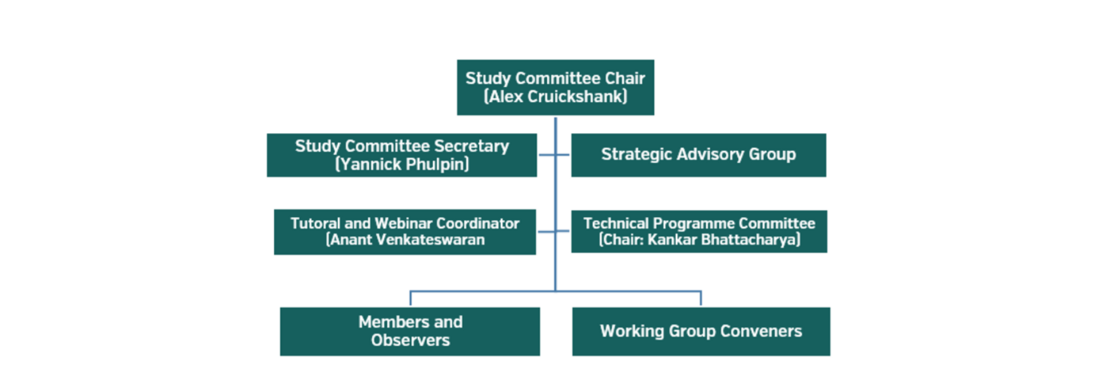Electricity Markets and Regulation
By Alex Cruickshank, Chair & Yannick Phulpin, Secretary
Introduction
Electricity Markets, like the objectives of the entities and systems that those markets serve, continue to evolve. Internationally, markets have developed and have successfully provided economic signals that support the development and operation of wholesale electricity. The success of those markets has allowed for the recognition, development and successful implementation of new technologies and solutions for supplying and purchasing electricity. This success has brought new demands on those markets. Market-based approaches have also been challenged by sudden changes in external factors (e.g. weather, commodity prices).
Study Committee C5 is expanding its focus to report on and discuss the regulatory and market issues associated with the changing electric power industry, which includes generation, storage, transmission and distribution, and electricity demand management. SC C5 members provide needed insight to the wide variety of market and regulatory requirements involved with providing reliable energy with the changes in energy policy, technology development, consumer choice, and climate conditions.
Moreover, the changing landscape of behind-the-meter supply and the growing recognition for different levels of reliability and flexibility provides changes in industry requirements and consequent changes in market designs and regulations to properly incentivise the providers and consumers.
Scope of work
The scope of the Study Committee is to analyse the impacts on the planning and operation of electric power systems of different market approaches and solutions; and of new structures, institutions, actors and stakeholders. The role of competition and regulation in improving end-to-end efficiency of the electric power system.
Structure of SC C5
The structure of the Study Committee is shown below:

SC C5 Membership
The current membership of the Study Committee is available on our website. The Study Committee has 24 ordinary members and 17 observers. Together, the members and observers represent 38 different countries.
WG Membership
The Working Group membership and demographics are examined in March of each year. The report for 2022 noted that the Study Committee had 6 Working Groups (7 at the time of this report). There were 153 members in the Working Groups. The WG members were spread across 31 countries. Our Working Groups had 13% female membership and a smattering of NGN members.
Principal areas of interest
The Study Committee focuses on three key areas:
- Market structures and products. Market design, physical & financial markets and their interaction, isolated and interconnected systems, interactions with Hydrogen systems.
- Market approaches and tools. Demand & price forecasting, financial risk management, demand management and active customer integration, integration of blockchain technologies.
- Regulations. Regulatory objectives, regulatory approaches, transmission pricing, ancillary service pricing, reliability and economics).
In addition, the Study Committee is interested in:
- Changes in regulatory roles and jurisdiction related to the interaction between the transmission system and the distribution system.
- The role of markets, including: the integration and coordination of distributed energy resources; the impact on wholesale market price formation caused by non-wholesale market participants; the need for and development of distribution service providers.
- The impact of emerging technologies on system operations.
- Market clearing procedures, techniques and principles used to take advantage of the flexibility of aggregating large numbers of end-users.
- Potential market rule changes to address changes in traditional ancillary service products.
Areas of attention
The current areas of attention, which are reflected in the current working groups, are listed below.
Demand side developments and their integration into existing market structures
Innovative DR mechanisms and EV charge/discharge solutions have become a priority in the transition to low carbon energies. The WGs focus on the role of transmission system operators (TSOs) and distribution system operators (DSOs) in managing DR and EV services (e.g. operational time frames, service procurement mechanisms, payment methods, and activation of such services) and on the development of market-based approached for the management of these services (time frame, bid structure, and pricing mechanisms.)
- WG C5.26 - Auction Markets and Other Procurement Mechanisms for Demand Response
- WG C5.31 - Wholesale and Retail Electricity Cost Impact of Flexible Demand Response
- WG C5.34 - Electric vehicle charge/discharge flexibility in wholesale energy markets
Market Drivers and development in markets
The purposes for market changes, the initiators of those changes, the processes for selecting a proposed change and the success of changes in meeting their objectives.
- WG C5.28 - Energy Price Formation in Wholesale Markets (completed during 2022)
- JWG C5/C6.29 - New Electricity Markets, Local Energy Communities
Environmental Regulation in the Electricity Sector
A variety of regulatory or market-based approaches are implemented to manage environmental constraints, such as reductions in greenhouse gas emissions.
- WG C5.32 - Carbon Pricing in Electricity Markets
Blockchain use cases to support electricity markets
In-depth look at the potential applications for blockchain in the area of energy trading
- WG C5.33 - Trading Electricity with Blockchain Systems
Sector integration for renewable gas — primarily Hydrogen
Approaches to integrate Hydrogen solutions in electricity markets, particularly the development of markets and regulations relating to renewable hydrogens, and possibly related renewable gases.
- JWG C5/C1.35 - Integration of Hydrogen in Electricity Markets and Sector Regulation
- WG C5.36 - Certification of electricity used to produce hydrogen
2022 Paris Session
Group Discussion Meeting
The CIGRE 2022 Session included an in-person general discussion meeting, for the first time since 2018.
The Preferential Subjects of the 2022 CIGRE Session attracted papers that cover the analysis of the impacts on the planning and operation of electric power systems of different market approaches and solutions. This includes new structures, institutions, actors and stakeholders as well as the role of competition and regulation in improving end-to-end efficiency of the electric power system. SC C5 had 40 papers from 20 countries.
The Discussion Group Meeting was chaired by the Study Committee Chairman, Alex Cruickshank, with Kankar Bhattacharya, Samir C. Saxena, and A. Venkateswaran as Special Reporters and Yannick Phulpin as SC C5 Secretary. In total, there were 31 prepared contributions and a handful of spontaneous contributions that triggered timely and lively discussions.
Large Disturbance Workshop
The Study Committee convened a workshop, in conjunction with SC C2 to examine large disturbances in energy market and systems. The Large Disturbance workshop has been convened by CIGRE during the Paris Session for many years and recently has included market disturbances. In total more than 500 people attended the workshop.
Panel session
The Study Committee also convened one panel session in conjunction with IEEE, to examine pilot projects implementing blockchain technology to manage electricity-related trades. The panel session was preceded by a tutorial on Blockchain.
Tutorials
The Study Committee organized two tutorials. In addition to the tutorial noted above, WG C5.32 presented a tutorial based on their work examining carbon pricing in electricity markets.
Topics of current and recent Working Groups
WG C5.26 - Auction Markets and Other Procurement Mechanisms for DR Services
One of the key features of smart grids is that they have strengthened the interest in demand-side resources such as distributed generation, on-site storage, and DR. How the DR services are procured- via auction markets, long-term contractual mechanisms, or other, and implemented in market operations in various electricity markets around the world is worth studying and understanding. This Working Group (WG) will identify the various complexities in different DR procurement mechanisms, and their operational aspects. The WG will identify the barriers in different models and develop a global outlook for management of DR services.
WG C5.28 - Energy Price Formation in Wholesale Electricity Markets
The structure of wholesale electricity markets impacts how prices are formed, and how accurately prices reflect the true cost of serving load. As the dynamics of the electric power sector change – especially the characteristics of the generation mix – there is a need to evaluate whether pricing mechanisms are adequately valuing wholesale electricity.
This Working Group will analyse price formation with a focus on wholesale energy markets. The group will gather information about pricing mechanisms as they exist today and examine if these mechanisms are working as desired. For example, are energy markets incentivising desired operational behaviour? Are out-of-market (uplift, make-whole) payments impacting desired price signals? Are there attributes not currently valued in energy markets – like flexibility or environmental externalities – that should be considered in price formation? After evaluating today’s energy pricing landscape, the Working Group will discuss potential enhancements that could more accurately reflect the true cost of wholesale energy.
JWG C5/C6.29 - New Electricity Markets, Local Energy Communities
Today it becomes more and more efficient to develop local energy systems based on distributed energy resources (DER) allowing customers to become energy suppliers. Adding locally batteries to dispersed generators, stationary or within electric vehicles, allows for a group of citizens or more generally for any group of consumers, to settle their own local structure for their supply of electricity, becoming a local energy community (LEC). With the digitalization of economy and some specific tools such as block chain, each of this group may organize easily its local market. Depending on national regulation, LEC can or not own and/or operate the network, or even target to be physically balanced, enabling islanded operation. As underlined by the recent Clean Energy Package in the EU, regulation is under development for LEC.
This JWG will liaise with parallel JWG D2/C6.47 “Advanced Consumer-Side Energy-Resource Management Systems”.
WG C5.30 - The Role of Block Chain Technologies in Power Markets
This Working Group consists of two streams of work.
The first phase, Exploration, is an assessment of the potential value and uses of block chain technologies in energy markets and power systems. This will include an explanation of how they work and some simplified examples of possible applications. Specifically, this stage will:
- gather information on the characteristics of distributed ledger products.
- consider the range of potential applications in electricity both for financial and physical parameters
- consider the implications for the electricity industry: efficiency and scope for new approaches with vastly more transactions - vs - disruption and the risk of being bypassed
The second phase, Assessment, will be a review of a range of trials and examples of early adoption of projects that use block chain, to document their value and practicality. During the project, a set of assessment criteria will be developed and applied to the trials and examples.
WG C5.31 - Wholesale and Retail Electricity Cost Impact of Flexible Demand Response
The study aims to provide an international view of the connection between retail programs/rate structures to costs incurred in the provision of electric service that may be impacted by flexible demand response (DR). Demand response (DR) includes all forms of demand-side response, which refers to a change in load coordinated with system or market needs. The change in load behind the utility meter of the customer can stem from end-use equipment, storage, PV, and other forms of distributed generation.
The study also aims to analyse the methods applied in practice to either directly or indirectly reduce costs, by service territory, in both regulated and competitive market environments. Introductory background on the functions that flexible DR supports and how it is factored into system planning and/or operations will be addressed at a high-level to provide context for presentation of findings by service territory.
The study will also identify and clarify terminology, in order to assist data collection and presentation of findings with consistency to support ready comparison of findings across service territories.
WG C5.32 - Carbon Pricing in Wholesale Electricity Markets
This Working Group will analyse mechanisms for pricing carbon and other greenhouse gases in wholesale electricity markets. While other studies such as those by the World Bank provide an overview of existing and emerging carbon pricing initiatives, this Working Group will focus specifically on their impacts on electricity markets.
The group will gather information about carbon pricing mechanisms as they exist today and examine if these mechanisms are working as desired. For example, are market participants and regulators supporting the market approach or not and what types or border adjustment mechanisms are being used.
The Working Group will analyse key themes and trends among the various market mechanisms and initiatives.
WG C5.33 - Trading electricity with blockchain systems
This Working Group will build on the work of C5.30 and drill down into the actual use of blockchain for trading and marketing in operational systems including the contribution which can be made to balancing the power system. The analysis will include an assessment of where the technology is used, which implementations of blockchain are used, the tools which have been developed using blockchain and a description of how they work. The key issue will be what benefits blockchain brings which cannot be achieved with other technologies.
WG C5.34 - Summary of current uses of electric vehicle charge/discharge flexibility in wholesale energy markets and reliable grid operations
This Working Group will summarize the current uses of Electric Vehicles and EV charging networks in the operations and market optimization of the wholesale power grid. The evaluation will summarize the locations, purposes/services/pricing, participant roles, requisite technology and requisite regulatory frameworks of current uses of EVs in wholesale grids. The final report will provide insight into both the common and bespoke elements of current integrations providing a framework for assessing potential future standardization of EV integration. The final report will also identify areas of need for future assessment for successful standardization of EV integration.
WG C5.35 - Integration of hydrogen in electricity markets and sector regulation
This Working Group will gather information about grid connection to hydrogen technology resources and new initiatives for analysing effect on electricity market such as Capacity Market, Day ahead Market as well as market coupling on Commodity market: Natural Gas price in Spot and Forward Market. In addition, this group will gather hydrogen related information and analyse regulation issues in various countries and continents which currently are established or are planned for the future.
WG C5.36 - Certification of the electricity used to produce hydrogen
The Working Group will recommend attributes that are considered to define hydrogen as green and will also structure the parameters that need to be certified so that it is possible to verify if hydrogen is green or if it has a greenhouse gas emission content.

CIGRE active Working Groups / Call for experts
Latest publications for 2021 and 2022
Technical Brochures
The Study Committee published two Technical Brochures:
Articles in CIGRE newsletters and Electra
In addition to the two Technical Brochure summaries, the Study committee contributed four articles for Future Connections and Electra:
- The role of blockchain technologies in power markets by David Bowker.
- Energy price formation in wholesale electricity markets by Natalie Tacka and Adam Keech.
- A season of high electricity prices in Europe by Vincent Ringeissen, Christian Hewicker and Yannick Phulpin.
- Virtual Power Plants are leveraging Australian consumer investment in rooftop solar by Gabrielle Kuiper.
Pending Technical Brochures for 2022/23
Three Working Groups expect to complete their work and publish Technical Brochures in the coming 12 months:
- The Role of Block Chain Technologies in Power Markets
- Carbon Pricing in Wholesale Electricity Markets
- Wholesale and Retail Electricity Cost Impact of Flexible Demand Response

Pending Study Committees C5 meetings
- 2023: Cairns, Australia - CIGRE Symposium, September 4-7
- 2024: Paris, France - CIGRE Session, August 25-30


